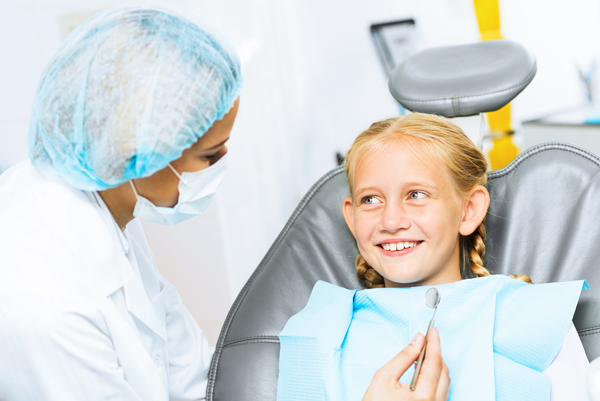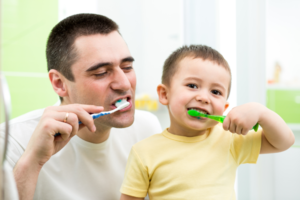Where Can I Find The Best Orthodontist In Franklin Square NY?
Our team at First Class Orthodontics are experts in orthodontic treatment in Franklin Square NY. As a leading orthodontist, Dr. Boral specializes in treating patients of all ages and dental conditions. As a result, we are able to provide thorough and effective treatment that achieves optimal results as quickly as possible.
When Should A Child Have Their First Visit With An Orthodontist?
There is no set age for a child to have their first orthodontic visit. The American Association of Orthodontists recommends that children see an orthodontist around age 7, once their permanent teeth come in. At this age, many issues including uneven bite and overcrowding are apparent and treatable. Starting the process early allows a Franklin Square orthodontist to be able to identify problems and decide the best treatment options available.
What Happens During A Child’s First Visit With An Orthodontist?
 At the first visit, a Franklin Square orthodontist examines your child’s teeth, mouth, and jaw. We evaluate a child’s current condition from teeth alignment, bite positioning, chewing functionality, and more to identify any arising problems. Dr. Boral may take X-rays of the teeth and mouth to see positioning and whether any permanent teeth are still coming in. These digital images allow for an orthodontist to determine the best form of orthodontic treatment available to fix the necessary issues.
At the first visit, a Franklin Square orthodontist examines your child’s teeth, mouth, and jaw. We evaluate a child’s current condition from teeth alignment, bite positioning, chewing functionality, and more to identify any arising problems. Dr. Boral may take X-rays of the teeth and mouth to see positioning and whether any permanent teeth are still coming in. These digital images allow for an orthodontist to determine the best form of orthodontic treatment available to fix the necessary issues.
What Are The Benefits Of Early Orthodontic Treatment?
The goal of early treatment is to intercept any developing orthodontic problems, eliminate the causes, and provide adequate space for future permanent teeth. Some patients require a second course of treatment after all permanent teeth are in to shift teeth into their best positions. An orthodontist may recommend treatment while a child still has some baby teeth for conditions including:
- Underbites
- Crossbites
- Abnormal bites
- Excessively spaced teeth
- Overcrowded and missing teeth
- Pacifier or thumb sucking that is affecting teeth or jaw growth
Finding Out When Children Should Have Their First Orthodontic Visit
In conclusion, our team at First Class Orthodontics are experts in orthodontics. We are here to answer any questions or concerns you may have regarding braces, Invisalign, or when children should have their first orthodontic visit in Franklin Square NY, West Hempstead NY, Valley Stream NY, Elmont NY, and Garden City NY. Contact First Class Orthodontics today to schedule a free consultation. Call now (516) 292-6484.

 516.292.6484
516.292.6484

 Thumb sucking, similar to pacifiers, may assist very young children develop jaw muscles. However, after that, it quickly becomes an issue. Thumb sucking is a habit that may cause a child to withdraw and ‘zone out’ instead of interacting. While thumb sucking may appear like an innocent habit, the results can affect your child’s health later on in their adult life. The long-term negative consequences of thumb sucking include:
Thumb sucking, similar to pacifiers, may assist very young children develop jaw muscles. However, after that, it quickly becomes an issue. Thumb sucking is a habit that may cause a child to withdraw and ‘zone out’ instead of interacting. While thumb sucking may appear like an innocent habit, the results can affect your child’s health later on in their adult life. The long-term negative consequences of thumb sucking include:
 Moderate alcohol consumption can be considered apart of a healthy lifestyle. However, alcohol isn’t generally considered “healthy.” Alcohol abuse is the second most common risk factor for oral cancer. The short and long-term effects alcohol has on your mouth, gums, and teeth include:
Moderate alcohol consumption can be considered apart of a healthy lifestyle. However, alcohol isn’t generally considered “healthy.” Alcohol abuse is the second most common risk factor for oral cancer. The short and long-term effects alcohol has on your mouth, gums, and teeth include:
 The long-term use of a pacifier changes mouth shape and the alignment of teeth. According to the American Academy of Pediatric Dentistry, the overuse of pacifiers affects mouth and teeth development the same way as long-term thumb-sucking. As a child’s upper front teeth tip forward, teeth may become crooked, which leads to biting problems. There may also be changes in jaw alignment and tooth positioning. The
The long-term use of a pacifier changes mouth shape and the alignment of teeth. According to the American Academy of Pediatric Dentistry, the overuse of pacifiers affects mouth and teeth development the same way as long-term thumb-sucking. As a child’s upper front teeth tip forward, teeth may become crooked, which leads to biting problems. There may also be changes in jaw alignment and tooth positioning. The 
 516.292.6484
516.292.6484